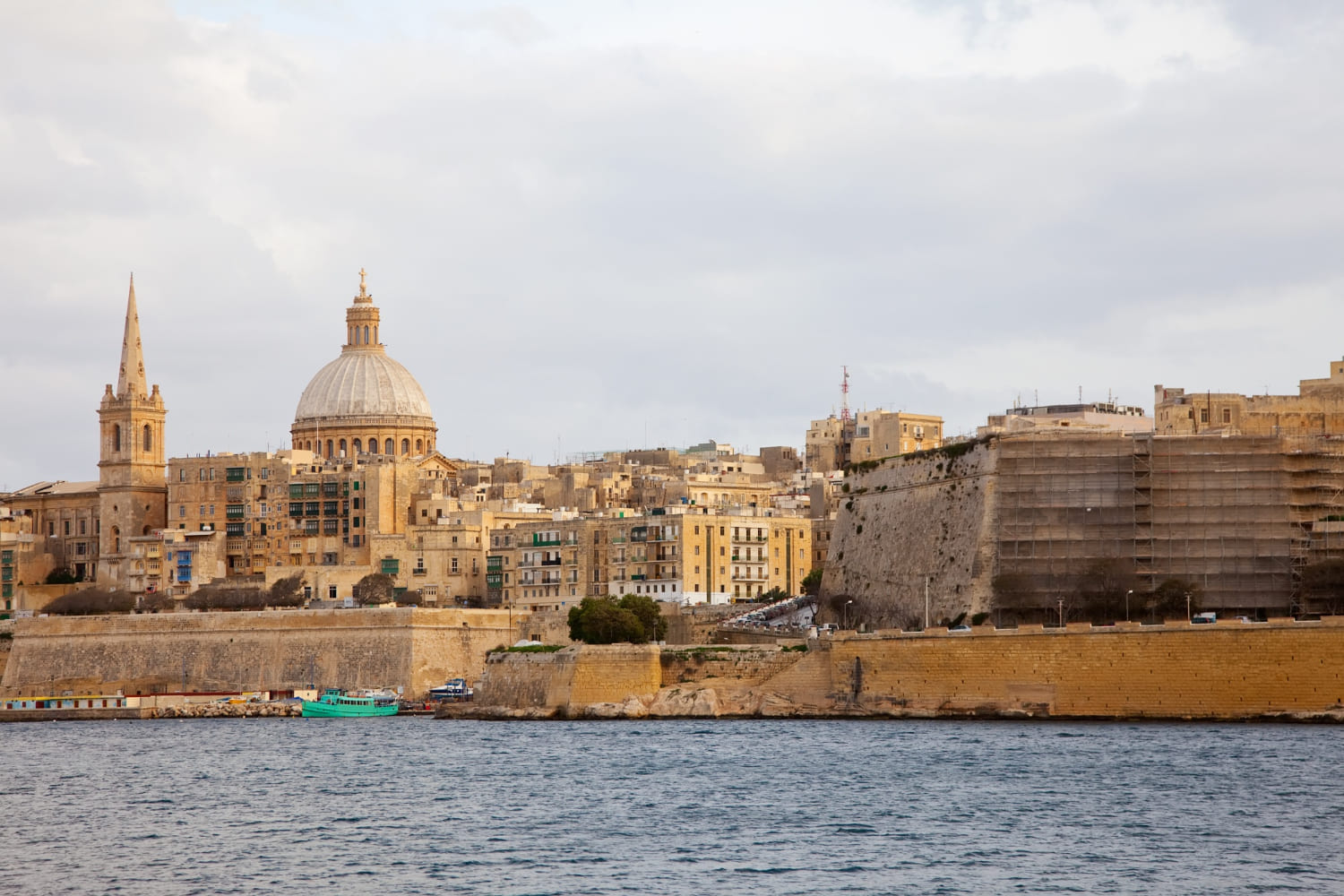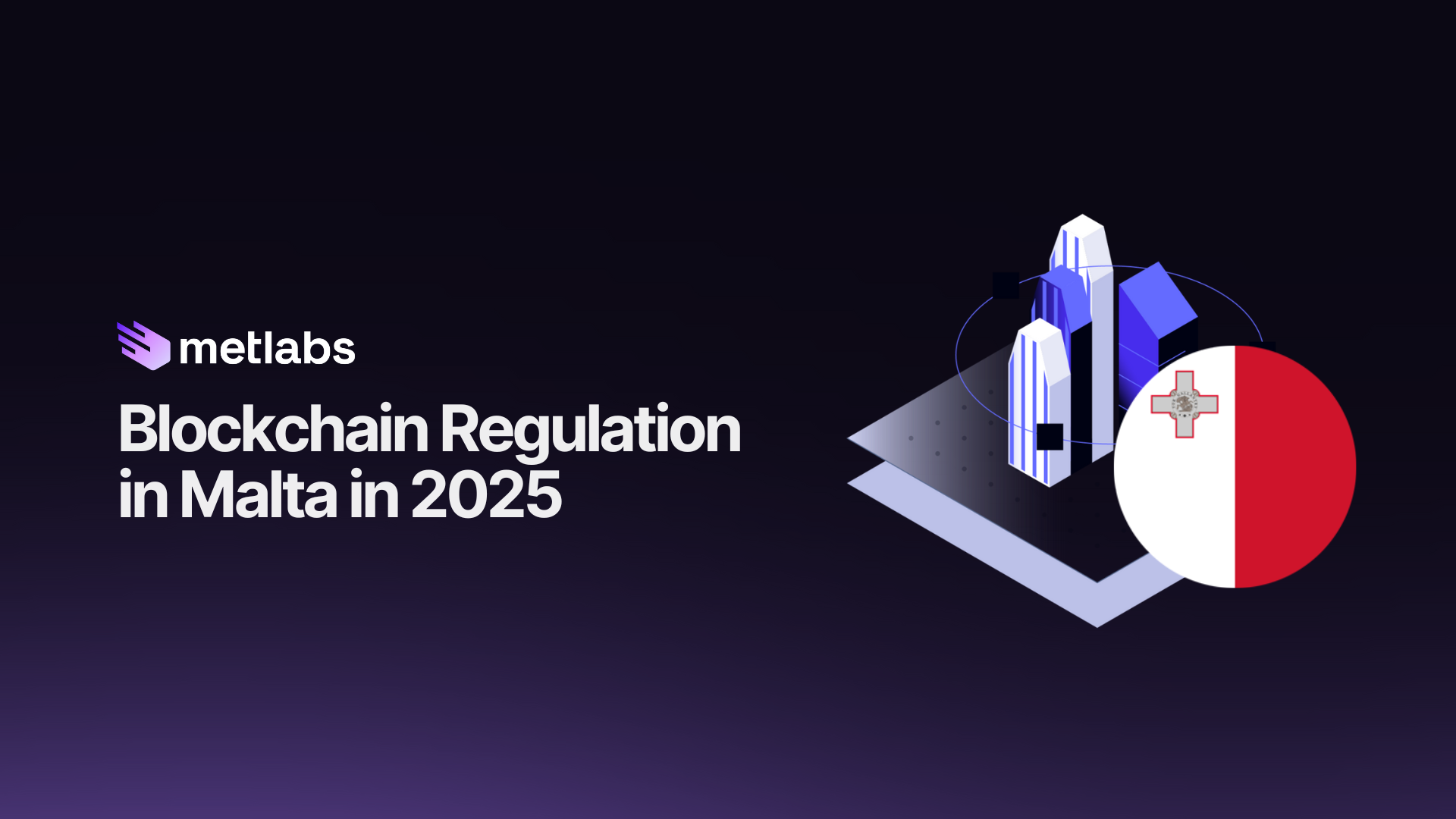The adoption of blockchain technology and asset tokenization is advancing at a rapid pace, but the real engine driving its global development is the existence of a clear, consistent and innovation-friendly legal framework.
Some countries have already established themselves as regulatory benchmarks, establishing specific rules for cryptoassets, DLT infrastructures and token issuance with legal backing. In this article we show you the relevant information about blockchain regulation in Malta, which you can use as a guide if you are looking to operate internationally or evaluate different strategic locations.

Current legislation on blockchain and virtual assets in Malta
MiCA Regulation (Markets in Crypto-Assets Regulation)
Establishes the EU’s first comprehensive legal framework for regulating cryptoasset issuers and service providers (CASPs). Covers stablecoins, utility tokens, electronic money tokens (EMTs), asset referenced tokens (ARTs), and custody or exchange platforms. Requires prior authorization, governance requirements, solvency, transparency, and user protection.
MiFID II (Markets in Financial Instruments Directive II)
European Directive that regulates the markets of traditional financial instruments and also applies to cryptoassets considered as financial instruments (e.g. security tokens). It establishes rules on transparency, investor protection, advisory services, order execution and prudential requirements for investment firms.
Virtual Financial Assets Act (VFAA)
Establishes the regulatory framework for the issuance, marketing and provision of virtual financial asset (VFA) services in Malta. It regulates ICOs, exchanges, custodians and advisors, requires prior licensing by the MFSA and mandatory appointment of VFA agents, as well as compliance with strict AML/CFT and transparency standards. The VFAA introduces the financial instrument test to determine the regulatory nature of each token.
Innovative Technology Arrangements and Services Act (ITAS Act)
The ITAS Act regulates the registration and certification of innovative technology arrangements, such as blockchain platforms and smart contracts, and establishes requirements for technology service providers. Under this law, the MDIA certifies the security, integrity and functionality of DLT infrastructures, promoting trust and innovation in the digital sector.
Malta Digital Innovation Authority Act (MDIA)
The MDIA Act creates the Malta Digital Innovation Authority, responsible for overseeing, certifying and promoting technological innovation in the country. The MDIA acts as a cross-cutting regulator for blockchain and DLT projects, collaborating with the MFSA and other authorities to ensure integrity, transparency and regulatory compliance in the digital asset sector.
Tokenization makes it possible to digitally represent real-world assets through blockchain, but for it to have legal value, it is essential that there is a regulatory framework that recognizes this operation. Malta adopts its own approach, establishing specific rules for the issuance, custody or trading of tokens. In this block we explain how asset tokenization is regulated from a legal point of view, taking an advanced jurisdiction such as Malta as an example.
Regulation of asset tokenization in Malta
Asset tokenization in Malta is regulated by a robust and pioneering framework in Europe, articulated mainly through the Virtual Financial Assets Act (VFAA), the ITAS Act and the MDIA Act, and since 2024, by the MiCA Regulations.
Financial asset tokenization projects are subject to the financial instrument test established by the VFAA, which determines whether the token is a financial instrument (regulated by MiFID II and the Investment Services Act) or a virtual financial asset (regulated by the VFAA). The issuance and trading of these tokens requires the submission of a white paper to the MFSA, the appointment of a VFA agent and compliance with transparency, governance and investor protection requirements.
For non-financial assets, tokenization is evaluated on a case-by-case basis, in addition to the general MiCA and AML/CFT obligations. The MDIA certifies the technological infrastructures employed, ensuring the integrity and security of DLT platforms. Malta participates in the European Blockchain Sandbox and encourages innovation through tax incentives and inter-institutional collaboration, although it does not have a formal national regulatory sandbox.
Regulatory bodies and authorities for digital assets in Malta
Malta Financial Services Authority (MFSA)
The MFSA is the leading authority in the regulation of cryptoassets in Malta. It supervises CASPs under the VFA Act and, since 2025, acts as the competent authority for the granting and supervision of licenses under the MiCA Regulation. It assesses the suitability of applicants, monitors prudential requirements, reviews whitepapers and can impose sanctions.
Malta Digital Innovation Authority (MDIA)
It is responsible for the technological certification of DLT infrastructures, smart contracts and platforms used in the issuance or management of digital assets. It guarantees the technical integrity and auditability of the solutions used, and although it is not legally mandatory for all activities, it may be required as part of the regulatory validation process.
Financial Intelligence Analysis Unit (FIAU)
It is the financial intelligence unit responsible for AML/CFT supervision of VFA Service Providers and CASP. It evaluates KYC policies, conducts inspections and can issue binding directives, in addition to managing the register of regulated entities and cooperating with European authorities and the FATF.
Launching a business based on digital assets requires more than just technology: it is also necessary to comply with legal requirements such as licensing, registration and regulatory obligations. These conditions ensure that the business model is viable and sustainable over time, and that it meets transparency and fraud prevention standards. In this section we explore what licenses are typically required and what compliance criteria blockchain companies operating in Malta must follow.

What licenses and requirements are needed to trade cryptoassets in Malta?
CASP License (MiCA)
CASP licensing is mandatory under the MiCA Regulation for exchanges, custodians and issuers of ART and EMT tokens operating in Malta or the EU. The license must be obtained from the MFSA or the relevant authority in another member state and involves capital, governance, user protection and technical security requirements. The transition from the VFA regime to MiCA must be completed by December 30, 2025.
VFA License under the VFA Act
Prior to MiCA, Malta operated under the Virtual Financial Assets Act, which establishes four classes of licenses for VFA Service Providers depending on the type of activity (exchange, advisory, custody, etc.). Although this regime remains in place for certain tokens excluded from MiCA, many entities are migrating to MiCA licensing.
Registration and technical certification
Although not a mandatory requirement, many platforms choose to certify their DLT solutions to the MDIA to reinforce their credibility with investors and regulators. This process involves cybersecurity audits, code integrity validation, operational resiliency testing and evaluation of the technology governance system. In some cases, the MFSA may require this certification as a condition of granting or maintaining a license.
Mandatory AML/KYC compliance
All operators must comply with Maltese legislation on the prevention of money laundering and terrorist financing. This includes customer identity verification, transaction monitoring, internal risk policies and suspicious transaction reporting to the FIAU. Non-compliance may result in administrative sanctions, revocation of licenses and inclusion in lists of non-compliant subjects.
Are you exploring developing your blockchain project in Malta?
At Metlabs we help companies like yours and offer comprehensive support in the development of blockchain projects and tokenization of assets such as real estate, carbon credits, commodities, intellectual property, financial instruments, franchises and more, fully aligned with blockchain regulation in Malta and international regulatory standards.
Contact us and find out how we can help you meeting all your business model needs, from technical validation and structuring to design, development and implementation of custom blockchain solutions, ready to scale from day one.



